新目标初中英语语法归纳(全)
- 格式:doc
- 大小:781.50 KB
- 文档页数:58
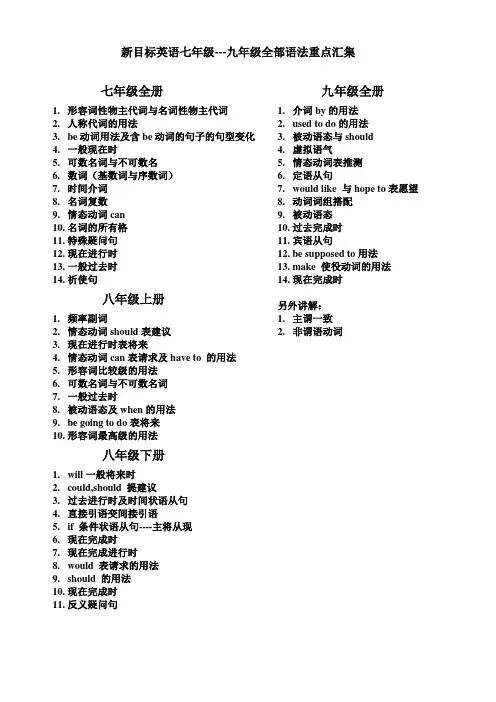
新目标英语七年级---九年级全部语法重点汇集七年级全册1.形容词性物主代词与名词性物主代词2.人称代词的用法3.be动词用法及含be动词的句子的句型变化4.一般现在时5.可数名词与不可数名6.数词(基数词与序数词)7.时间介词8.名词复数9.情态动词can10.名词的所有格11.特殊疑问句12.现在进行时13.一般过去时14.祈使句八年级上册1.频率副词2.情态动词should表建议3.现在进行时表将来4.情态动词can表请求及have to 的用法5.形容词比较级的用法6.可数名词与不可数名词7.一般过去时8.被动语态及when的用法9.be going to do表将来10.形容词最高级的用法八年级下册1.will一般将来时2.could,should 提建议3.过去进行时及时间状语从句4.直接引语变间接引语5.if 条件状语从句----主将从现6.现在完成时7.现在完成进行时8.would 表请求的用法9.should 的用法10.现在完成时11.反义疑问句九年级全册1.介词by的用法ed to do的用法3.被动语态与should4.虚拟语气5.情态动词表推测6.定语从句7.would like 与hope to表愿望8.动词词组搭配9.被动语态10.过去完成时11.宾语从句12.be supposed to用法13.make 使役动词的用法14.现在完成时另外讲解:1.主谓一致2.非谓语动词。
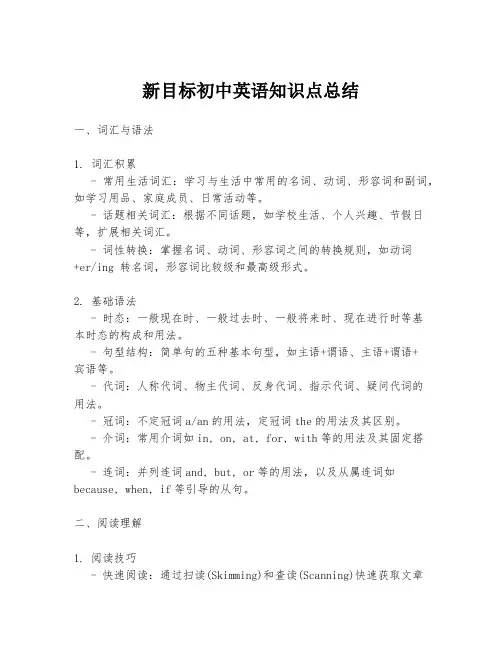
新目标初中英语知识点总结一、词汇与语法1. 词汇积累- 常用生活词汇:学习与生活中常用的名词、动词、形容词和副词,如学习用品、家庭成员、日常活动等。
- 话题相关词汇:根据不同话题,如学校生活、个人兴趣、节假日等,扩展相关词汇。
- 词性转换:掌握名词、动词、形容词之间的转换规则,如动词+er/ing 转名词,形容词比较级和最高级形式。
2. 基础语法- 时态:一般现在时、一般过去时、一般将来时、现在进行时等基本时态的构成和用法。
- 句型结构:简单句的五种基本句型,如主语+谓语、主语+谓语+宾语等。
- 代词:人称代词、物主代词、反身代词、指示代词、疑问代词的用法。
- 冠词:不定冠词a/an的用法,定冠词the的用法及其区别。
- 介词:常用介词如in, on, at, for, with等的用法及其固定搭配。
- 连词:并列连词and, but, or等的用法,以及从属连词如because, when, if等引导的从句。
二、阅读理解1. 阅读技巧- 快速阅读:通过扫读(Skimming)和查读(Scanning)快速获取文章大意和细节信息。
- 关键词定位:在阅读理解题中,学会根据问题关键词定位到文章相关段落。
- 逻辑推理:根据上下文线索,进行逻辑推理以理解文章隐含意义。
2. 题型解析- 事实细节题:直接从文章中找到答案,注意准确和细致。
- 主旨大意题:理解文章的中心思想或标题,通常不直接出现在文章中。
- 推理判断题:根据文章内容进行逻辑推理,得出结论。
- 词义猜测题:根据上下文推测生词或短语的含义。
三、写作技巧1. 文章结构- 开头:引入话题,明确文章主题。
- 正文:分段阐述观点,每段一个中心句,后跟支持细节。
- 结尾:总结全文,呼应开头,或提出建议和展望。
2. 写作类型- 描述性写作:描述人物、地点、事件等,注意使用形容词和副词。
- 叙事性写作:讲述故事或事件,注意时态和顺序。
- 议论性写作:表达个人观点,给出理由和例证,注意逻辑性和说服力。
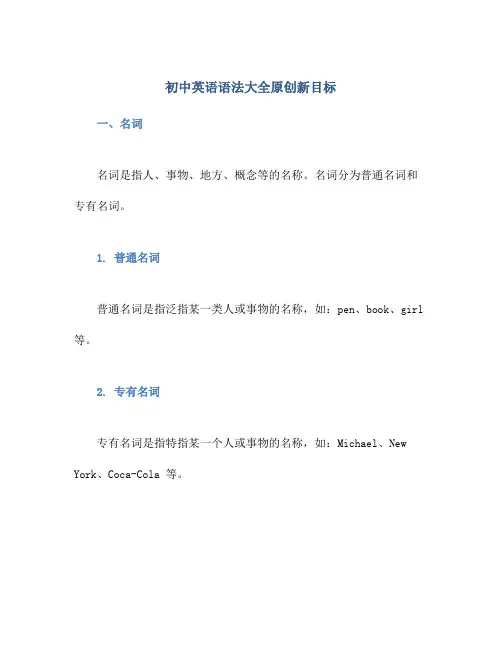
初中英语语法大全原创新目标一、名词名词是指人、事物、地方、概念等的名称。
名词分为普通名词和专有名词。
1. 普通名词普通名词是指泛指某一类人或事物的名称,如:pen、book、girl 等。
2. 专有名词专有名词是指特指某一个人或事物的名称,如:Michael、New York、Coca-Cola 等。
二、代词代词是用来代替名词的词语,分为人称代词、物主代词、指示代词、疑问代词和不定代词。
1. 人称代词人称代词用来代替人或事物的名称,分为主格、宾格和所有格,如:I、you、he、she、it、we、they。
2. 物主代词物主代词用来表示所有关系,分为形容词性和名词性,如:my、your、his、her、its、our、their。
3. 指示代词指示代词用来指示人或事物的位置或关系,分为近指和远指,如:this、that、these、those。
疑问代词用来提问人或事物的名称,如:who、whom、whose、what、which。
5. 不定代词不定代词用来泛指某一类人或事物,如:somebody、something、anybody、anything、nobody、nothing。
三、动词动词是表示动作、状态或行为的词语,分为实义动词和系动词。
1. 实义动词实义动词表示具体的动作或行为,可以分为及物动词和不及物动词,如:eat、run、sleep、work。
系动词用来联系主语和表语,表示主语的状态或特征,如:be、seem、look、sound、feel。
四、形容词形容词是用来修饰名词或代词的词语,分为限定形容词和性质形容词。
1. 限定形容词限定形容词用来说明名词或代词的具体特征,一般放在名词前面,如:big、beautiful、expensive。
2. 性质形容词性质形容词用来表示事物的性质或状态,一般放在系动词后面,如:happy、sad、tired。
副词是用来修饰动词、形容词或其他副词的词语,分为时间副词、地点副词、方式副词等。

人教版新目标九年级全一册英语语法知识点复习提纲动词变名词1.v+ ment 结尾achieve —— achievement 成就advertise —— advertisement 广告agree —— agreement 同意amuse——amusement 娱乐commit —— commitment 承诺,奉献evelop —— development 发展disagree —— disagreement 不赞同equip 装备—— equipment 装备,器材govern 统治—— government 政府manage——management 经营,管理argue —— argument 争吵2.V+ ion 结尾3.attract —— attraction 吸引4.discuss —— discussion 讨论5.express ——-expression 词语;表达6.instruct —— instruction 用法说明invent—— invention 发明7.predict ——prediction 预言8.impress —— impression 印象9.suggest ——suggestion 建议,暗示10.educate —— education 教育11.graduate —— graduation 毕业12.operate —— operation 操作,动手术13.illustrate —— illustration 阐明,举例说明14.pollute —— pollution 污染15.introduce ——introduction 介绍16.organize ——organization组织17.imagine —— imagination 想象力18.inspire——inspiration 灵感,鼓舞人心的事19.invite —— invitation 邀请20.compete —— competition 竞争,比赛21.pronounce ——pronunciation发音22.admit —— admission 承认23.permit —— permission 允许24.conclude —— conclusion 结论25.decide —— decision 决定26.describe —— description描写,描绘27.resolve —— resolution 决心28.solve ——solution 解决方法3.V+ ance 结尾\1.allow —— allowance 允许2.appear —— appearance 外貌,出现3.perform —— performance 演出4.exist —— existence 存在5.V+ ing 结尾1.end —— ending 结尾,结局2.train ——training训练3.mean —— meaning 意义4.say—— saying 谚语5.remind —— reminding提醒6. bathe ——bathing沐浴6.词尾加-er或-or后变成表示“某一类人”的名词work——worker 工人7.teach——teacher老师8.sing——singer 歌手9.jump——jumper跳高运动员10.play——player表演者、运动员11.learn——learner 学习者12.visit——visitor访问者13.invent——inventor发明家7.V+ 其他8.beg——beggar 乞丐9.sit——seat 座位10.believe —— belief 信仰11.behave —— behavior 行为12.know—— knowledge 知识13.fly—— flight 飞行14.mix —— mixture 混合物15.press —— pressure 压力16.serve —— service 服务17.succeed ——success 成功18.pursue —— pursuit 追求,从事19.propose —— proposal 建议20.withdraw ——withdrawal 取钱;收回;撤退21.survive —— survival--survivor 幸存者22.arrive —— arrival到达23.analyze —— analysis 分析 2形容词变名词 1.词尾ent改为ency或ence24.efficient有效率的——efficiency 效率patient——patience/impatience 耐性/无耐心dependent——dependence依赖性independent——independence 独立性urgent——urgency 紧急25.2.ble结尾,ble改为bility26.possible—possibility 可能27.responsible—responsibility 责任;职责3.其他accurate—accuracy 准确性28.prosperous——prosperity 繁荣29.true——truth 真相30.wide——width 宽度31.long——length 长度32.high——height 高度 3名词/动词变形容词1.名词+y33.guilt 罪恶——guilty 内疚的34.health——healthy 健康的35.luck——lucky 幸运的36.cloud——cloudy 多云的37.wind—windy 多风的38.rain——rainy 多雨的39.snow——snowy 多雪的40.tourist —— touristy 游客多的er结尾,改er为ry hunger——hungry 饥饿的anger —— angry 生气的fog—— foggy 有雾的sun—— sunny 阳关灿烂的fur—— furry 毛皮的shine——shiny 发亮的taste —— tasty 美味的2.名词/动词+ ed以辅音+辅音结尾的单词,直接加edtalent —— talented 有天赋的offend ——offended 生气的crowd ——crowded 拥挤的以元音字母e结尾的单词直接加dbalance —— balanced 平衡的organize——organized 有组织的pollute ——polluted 被污染的please ——pleased 高兴的元音加辅音结尾的单词,词尾辅音双写再加edspot —— spotted 有斑点的3.名词+ ful/lesscare —— careful/ careless 小心的/ 粗心的help—— helpful / helpless 有帮助的/ 无助的use—— useful/ useless有用的/ 无用的meaning —— meaningful / meaningless有意义的/无意义的colour—— colourful /colourless多彩的/无色的pain 疼痛——painful /painless痛苦的/ 不痛的thank—— thankful / thankless 充满感激的/ 不知感恩的 peace 和平—— peaceful 和平的play游戏—— playful 爱玩耍的home —— homeless 无家可归的4.名词/动词+ able5.change —changeable 易变的6.adjust——adjustable 可调整的knowledge——knowledgeable 知识渊博的comfort—comfortable舒适的7.suit ——suitable 合适的动词以辅音加y结尾把y变i 加able ,deny—— deniable 可否认的rely—— reliable 可靠的4.名词+ ouscourage——courageous 勇敢的danger—— dangerous 危险的以y结尾,改y为i再加ousmystery 神秘—— mysterious 神秘的5.ce 变tconfidence—— confident 自信的difference——different 不同的6.dependence —— dependent 依赖他人的independence—— independent 独立的7.词尾加 aladdition—— additional 附加的,额外的music—— musical 音乐的person——personal (私人的)nation—— national 国家的education——educational有教育意义的tradition—— traditional 传统的origin起源——original 新颖的;独创的以元音字母e 结尾的单词,去掉词尾元音加al nature——natural 自然的globe—— global 全球的特例:class—— classical 经典的medicine 药——medical 医学的grammar—— grammatical 语法的8.名词+ lyfriend—— friendly 友好的live——lively 活跃的,有生气的love——lovely 可爱的week——weekly 每周的man——manly 男子气概的;强壮的9.词尾+ en10.wood—— wooden 木制的11.wool—— woolen 羊毛的10.表示方位的词11.East——eastern12.West——western13.outh——southern14.North——northern15.11.四大洲Asia 亚洲—— AsianAfrica 非洲——AfricanEurope欧洲—— EuropeanAmerica 美洲——American12.其他13.energy精力——energetic 精力充沛的strategy——strategic 战略的scientist——scientific 科学的fool 傻子——foolish 愚蠢的love——loving 慈爱的pleasure——pleasant令人愉快的/ pleased高兴的pride——proud 自豪的 4形容词变动词1.词尾加izemodern——modernize 使...现代化social——socialize 使...社会化2.词尾加enfast——fasten 使固定;集中于short—— shorten 缩短wide——widen 放宽less——lessen 使...减少特例(有变形):long——lengthen 使延长strong ——strengthen 加强;巩固3.词前加enlarge ——enlarge 扩大;放大 5形容词变副词1.形容词+ ly bad——badly 坏地bright——brightly 明亮地casual——casually 随意地cl ear——clearly 清楚地complete——completely 完全correct——correctly 正确地final——finally 最后fortunate——fortunately幸运地general——generally 一般来讲loud——loudly 大声地particular ——particularly特别地polite——politely 礼貌地proper ——properly适当地main——mainly 主要地most ——mostly 多半,大多数normal——normally 正常地quick——quickly 迅速地quiet——quietly 轻轻地,安静地real——really 真正地recent ——recently 最近;近来sad——sadly 悲哀地slow——slowly 缓慢地special——specially 专门,特殊地specific——specifically 特定地,明确地strong——strongly 坚决地,强烈地sudden——suddenly突然usual——usually 通常2.以le 结尾的,去e + yfortable——comfortably 舒服地gentle——gently 温柔地possible——possibly 可能地simple——simply 仅仅;只;简单地terrible——terribly 非常;极度地4.辅音字母+ y 变y为 ily5.easy——easily 容易地6.heavy——heavily 沉重地7.happy——happily 快乐地4.特殊good——well好地true——truly 真实地第11页共11页。

新目标初中英语语法大全学习提纲一、词类、句子成分和构词法:1、词类:英语词类分十种:名词、形容词、代词、数词、冠词、动词、副词、介词、连词、感叹词。
1、名词(n.):表示人、事物、地点或抽象概念的名称。
如:boy, morning, bag, ball, class, orange.2、代词(pron.):主要用来代替名词。
如:who, she, you, it .3、形容词(adj..):表示人或事物的性质或特征。
如:good, right, white, orange .4、数词(num.):表示数目或事物的顺序。
如:one, two, three, first, second, third, fourth.5、动词(v.):表示动作或状态。
如:am, is,are,have,see .6、副词(adv.):修饰动词、形容词或其他副词,说明时间、地点、程度等。
如:now, very,here, often, quietly, slowly.7、冠词(art..):用在名词前,帮助说明名词。
如:a, an, the.8、介词(prep.):表示它后面的名词或代词与其他句子成分的关系。
如in, on, from, above, behind.9、连词(conj.):用来连接词、短语或句子。
如and, but, before .10、感叹词(interj..)表示喜、怒、哀、乐等感情。
如:oh, well, hi, hello.2、句子成分:英语句子成分分为七种:主语、谓语、宾语、定语、状语、表语、宾语补足语。
1、主语是句子所要说的人或事物,回答是“谁”或者“什么”。
通常用名词或代词担任。
如:I’m Miss Green.(我是格林小姐)2、谓语动词说明主语的动作或状态,回答“做(什么)”。
主要由动词担任。
如:Jack cleansthe room every day. (杰克每天打扫房间)3、表语在系动词之后,说明主语的身份或特征,回答是“什么”或者“怎么样”。
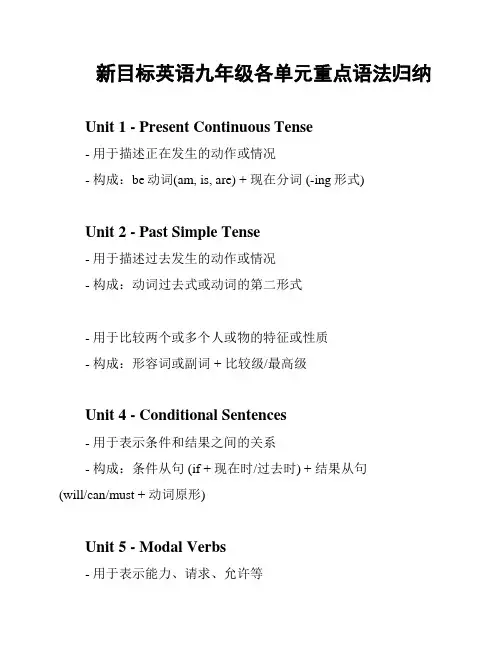
新目标英语九年级各单元重点语法归纳Unit 1 - Present Continuous Tense- 用于描述正在发生的动作或情况- 构成:be动词(am, is, are) + 现在分词 (-ing形式)Unit 2 - Past Simple Tense- 用于描述过去发生的动作或情况- 构成:动词过去式或动词的第二形式- 用于比较两个或多个人或物的特征或性质- 构成:形容词或副词 + 比较级/最高级Unit 4 - Conditional Sentences- 用于表示条件和结果之间的关系- 构成:条件从句 (if + 现在时/过去时) + 结果从句(will/can/must + 动词原形)Unit 5 - Modal Verbs- 用于表示能力、请求、允许等- 包括 can, could, may, might, must, should, shall, will, wouldUnit 6 - Passive Voice- 用于强调动作的承受者而不是执行者- 构成:be动词(am, is, are, was, were) + 过去分词Unit 7 - Reported Speech- 用于转述别人说的话- 构成:直接引语转变为间接引语,动词时态和人称发生变化Unit 8 - Future Forms- 用于表示将来的动作或情况- 包括 will, be going to, present continuousUnit 9 - Review of Tenses- 复各种时态的用法和构成以上是新目标英语九年级各单元的重点语法归纳。
希望对您有所帮助!。
![初中英语语法大全[原创]新目标(已打)](https://uimg.taocdn.com/c69a9dd8a32d7375a51780ac.webp)
初中英语语法大全[原创]新目标语法网络图一、名词1. 规那么名词的复数形式:名词的复数形式,一般在单数形式后面加-s或-es。
现将构成方法与读音规那么列表名词在句中表示所有关系的语法形式叫做名词所有格。
所有格分两种:一是名词词尾加’s构成,二是由介词of 加名词构成。
前者多表示有生命的东西,后者多表示无生命的东西。
用于无生命的东西:the legs of the chair, the cover of the book用于有生命的东西,尤其是有较长定语时:the classrooms of the first-year students 用于名词化的词:the struggle of the oppressed二、冠词冠词分为不定冠词〔a, an〕,定冠词〔the〕,和零冠词。
1. one, some 与any:1) one 可以泛指任何人,也可特指,复数为ones 。
some 多用于肯定句,any 多用于疑问句和否认句。
One should learn to think of others. Have you any bookmarks? No, I don’t have any bookmarks. I have some questions to ask.2) some 可用于疑问句中,表示盼望得到肯定的答复,或者表示建议,请求等。
Would you like some bananas? Could you give me some money?3) some 和any 修饰可数名词单数时,some 表示某个,any 表示任何一个。
I have read this article in some magazine. Please correct the mistakes, if any. 4) some 和数词连用表示“大约〞,any 可与比较级连用表示程度。
There are some 3,000 students in this school. Do you feel any better today? 2. each 和every:each 强调个别,代表的数可以是两个或两个以上,而every 强调整体,所指的数必须是三个或三个以上。
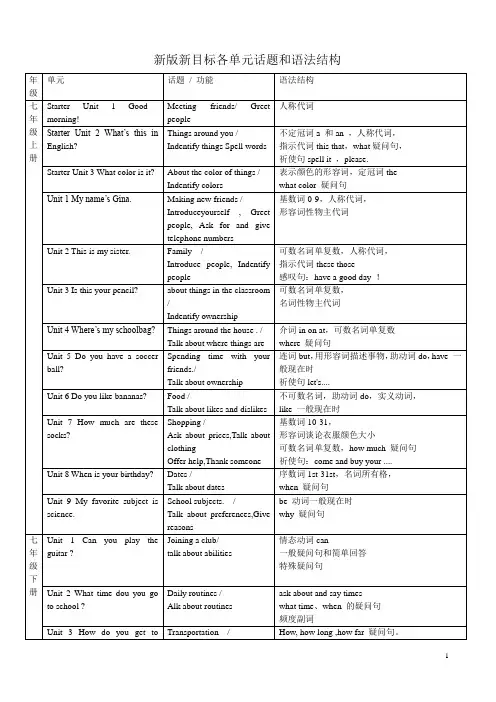
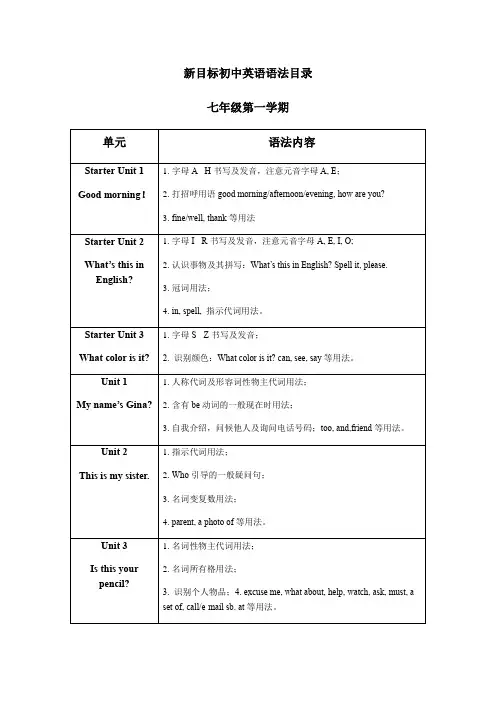
![初中英语语法大全[原创]新目标(已打)](https://uimg.taocdn.com/f33d4552be23482fb4da4ce8.webp)
九、定语从句✧I.定语从句起了形容词的作用,在句中修饰一个名词或代词。
被修饰的词叫做先行词,引导定语从句的词叫关系词,十、名词性从句十一、状语从句十二、倒装句1 It was not until midnight that he finished his task.2.Not until he came back from abroad was I able to see him again.3.The harder you work, the greater progress you will make.4.He walked around the house, gun in hand.5.May you be in good health!6.Wish you a pleasant journey back home!7.The professor was a humorous man with big nose and deep-set eyes.8.What surprised me most was his imagination and patience.9.He lay on the grass, with his eyes looking at the sky and his hands under his head.10.Sitting under the tree are Mr. Green and his first teacher.11.On the wall hang two pictures of famous scientists.12.Looking back upon those past years, he couldn’t help feeling very proud.13.No sooner(Hardly) had he arrived at the theatre than(when) the play started.14.Young as he is, he has learned advanced mathematics.15.How I regret the hours wasted in the woods and fields!16.There stands a beautiful vase in the corner of the room.17.Ten miles north of the town lies a paper factory.18.There goes the bell.19.Nowhere has the world ever seen such a bird as here.20.It is no use crying for help.21.If only I had been your student in the middle school!22.It is believed that such a thing will not happen again.23.Only when he explained did I realize the reason for this.24.“He works particularly hard.”“So he does, and so do you.”25.Not only Alice but also Jane and Mary are tired of having one examination after another.26.Such was Albert Einstein, a simple person of great achievements十五、动词搭配1. add to增加,增进、add … to把…加进…、add up相加、add up to总计,所有这一切说明1) I don't think these facts will ________ anything.2) Fifty new books have been ________ the library.3) The music _________ our enjoyment of the film.4) You must have made a mistake when you _______ the bill ________.( add up to, added to, add to, added…up )2. break away from打破,脱离,挣脱,改掉、break down出毛病,身体(精神)衰弱,分解,拆开、break off暂停,中断、break in强行进入,插话、break into闯入、break into pieces成为碎片、break out爆发、break up 捣碎,驱散,瓦解,学期结束,拆散、break through突破1) The criminal managed to break _____________ the police and ran into the woods.2) When he heard the news, he broke _______ and cried.3) Don't break ________ while others are speaking.4) Why don't you break ________ for a few minutes and have some coffee?5) When does school break ________?6) After harvest we break _________ the soil with a tool pulled by two oxen.( away from, down, in, off, up, up )3. bring up抚养,呕吐,提出、bring about造成、bring out拿出,出版、bring in引入,引进,挣钱、bringback使回想起、bring down使下降,使倒下1) The shopkeeper brought his price _________ to only five dollars.2) The school has brought _________ new foreign teachers to teach oral English.3) The song brought ___________ happy memories of our schooldays.4) Do you know what brought ___________ this misunderstanding?5) The kind old man agreed to bring __________ the young orphan.6) We decided to bring the matter ___ at the next meeting.7) The wind brought _______ a lot of trees last night.8) Next month they will bring ________ a new edition of textbook.( down, in, back, about, up, up, down, out )4. call on号召,拜访(某人)、call at拜访、参观(某地)、call for去叫某人, 要求, 需要、call up使回忆起, 征召入伍、call in召集,请某人来、call out大喊,高叫、call off取消,不举行1) Doctors are often called _____ in the middle of the war.2) Please wait for me at home. I'll call _______ you at your house at seven tonight.3) The trains calls _______ several big cities between Beijing and Guangzhou.4) He called her name __________, but she didn't answer.5) The sports meet was called ____ on account of the rain.( in, for, at, out, off)5. come about发生,出现、come down下跌,落,降,传下来、come in进来、come into (sight/being/existence/use/notice/effect) 、come on来临/ 快点、come out出版,结果是、come along一道来,赶快、come to达到(an end/an agreement/a stop)苏醒,合计,总共是、come over走过来、come up发芽,走近、come across偶然碰到、come back回想起、come from来自,源自1) I come _________ the book I lent you last month.2) How did it come _________ that you both got lost? I thought you had a map.3) It suddenly came _________ to me where I had seen the boy before.4) Come __________ now, or else we shall be late.5) He came __________ me like a tiger.6) The price of petrol has come _________ since the beginning of this year.7) The word came __________ use many years ago.8) When the examination result came _________, he had already got a job.9)The bill came __________ over a thousand dollars.10) I sowed the seeds over a month ago, but they haven't come __________ yet.( for, about, back, on, at, down, into, out, to, up )6. cut across抄近路、cut down砍倒,削减、cut off切断,割掉,断绝关系、cut up连根拔除,切碎、through 剪断,凿穿、cut out删(省)掉,戒掉、cut in插嘴1) Don't cut ___ this tree. It will be very shady in summer.2) You must cut ________ the number of cigarettes you smoke, or it will cause illness.3) We decided to cut _________ the moor(旷野)to the village.4) Cutting the tree ____ means cutting the tree into pieces.5) The electricity was cut ___________ when the lady refused to pay the bill.6) We were having a pleasant conversation when Tom cut __________.(down, down, across, up, off, in )7. die of (disease/hunger/grief/old age)死于(疾病,饥饿,寒冷,情感原因)、die from死于(意外事故、情形)、die away渐渐消逝、die out绝种、die down(炉火)渐熄、die off逐一死去8. fall behind落后、fall over one's feet 跌跤、fall down掉下,跌倒、fall back撤退,后退1) Babies often fall _____ when they are learning to walk.2) Our team seems to have fallen __________ the others.3) As soon as the enemies fell __________, the people returned to their village.4) She fell__________ the bench and had her leg broken.(down, behind, back, over )9. go in for从事,喜爱,参加、go through通过,经受、go over复习,检查、go up(价格)上涨,建造起来、go after追捕,追赶、go against违反、go ahead先行,开始吧,问吧,说吧、go away离开、go by时间过去、go down下沉,降低,(日、月)西沉、go on(with)继续进行、go with相配,陪同、go without没有,缺少、go out 外出,熄灭、go all out全力以赴、go off爆炸,进行,变坏,断电,停止供应、go back on背约,食言、go beyond 超出1) Many new factories have gone __ in the past few years.2) Rents have gone __________ greatly recently.3) Many years have gone ___________ since we first met.4) Let's continue our journey until the sun goes _______.5) His actions went ___________ the will of the people,6) I can't do it, for it goes ___________ my duty.7) Over 100 students went ____________ this entrance examination.8) The bomb went ____________ and killed ten people.9) The buyer went ___________ the car carefully before reaching a decision.10) This tie doesn't go ___________ my blue shirt.11) If you think you can solve the problem, go ______.12) Many students went __________ playing basketball.(up, up, by, down, against, beyond, through, off, over, with, ahead, in for )10. get down下来,记下,使沮丧、get down to致力于,专心于、get on进展,进步,穿上,上车、get off脱下,下车、get in收集,插(话)、get away逃跑,逃脱,去休假、get over忘记,越过,克服,从疾病中恢复、get along with进展,相处、get up起床、get through打通电话,完成,通过、get round消息传开、get close to sth. 接近,几乎、get into (trouble) 、get to (know) 、get back取回,收回、get out1) She spoke so fast that I couldn't get ____ what he said.2) We will find ways to get _________ difficulties.3) The story has got __________, and everyone knows about it.4) When I get _________ with the report, I'll go to the cinema.5) After a delicious meal the two men got __________ to business.6) Don't always get __________ a word when others are speaking.7) It took me a long time to get ___________ such an unpleasant experience.(down, over, round, through, down, in, over)11. give away赠送,泄露,出卖、give out发出,疲劳,分发,公布、give off发出(光、热、气体)、give in (to sb.) 屈服、give up放弃,让(座位)1) His accent at last gave him __________.2) The liquid gave ________ a strong smell.3) The headmaster gave ___________ the names of the prize-winners.4) The soldiers gave _________ the town to the enemies.5) Who will help me to give the books ___________?6) Don't believe in those who give his friends ________.7) After a long walk, my strength gave ____________.(away, off, out, up, out, away, out)12. hand in交上,提交、hand out分发、hand down流传,遗传13. hang about闲逛、hang up挂电话14. hold back阻止,隐瞒、hold up举起,使停顿、hold on别挂电话,等,坚持、hold out持续,坚持,伸出、hold down控制,镇压1) I'm sure he is holding something _________.2) She managed to hold ______ her emotion until her guests had left. Then she cried.3) Tell him to hold ________ a moment. I'll come soon.4) Our food supply won't hold _________ for more than a few days.5) The train was held ________ as a result of the floods.6) These measures helped to hold ___________ the city's population.7) Hold ___________ your left arm, please.(back, back, on, out, up, down, up)15. keep up (courage, English, spirits)保持、keep up with跟上、keep off (grass)不接近,离开、keep away from 避开,不接近,离…远远的、keep out of 、keep to (rules, promise)坚持,遵守、keep on继续,坚持下来、keep back阻止,留下,隐瞒,扣下、keep from克制,阻止1) The angry lady told the strangers to keep ________ from her.2) I can hardly keep ________ my tears after hearing his words.3) Only pride kept her __________ bursting into tears.4) I can scarcely keep __________ asking him what he has done.5) "Don't touch me," screamed the woman, "Keep __________!"6) Keep _________ until you succeed.7) Keep _________ your courage, and you'll succeed in the end.8) The thick coat can keep the cold ___________.9) Always try to keep ___________ the rules when you play a game.10) I can't keep ________ with everything you're doing.(away, back, from, from, off, on, up, out, to, up)16. knock at/on敲、knock into撞到某人身上、knock down撞倒、knock out of把…敲出、knock over撞倒、knock off停止工作,休息1) The boxer soon knocked his opponent _________.2) The office stuff knocks _________ at six every day.3) Try knocking __________ the window and see if there is anyone indoors.4) He was so absorbed in his book that he knocked __________ the car parked there.(down, off, on, into)17. leave for离开前往、leave out删去,遗漏、leave behind遗留,忘记拿走、leave to留给,遗嘱赠于、leave over 遗留,剩下,延期1) "Whose name has been left __________?" demanded the teacher.2) When he died, he left all his property _____ his niece.3) He suddenly realized that he had left his umbrella ___________.4) Don't leave this matter _________ until tomorrow.5) Leave some meat ___________ for tomorrow.6) Those are questions left _________ by history.(out, to, behind, over, over, over)18. look up查找,向上看、look through翻阅,浏览、look on旁观、look on…as看作、look into调查、look after/ at / for 照顾/看/寻找、look out(for)当心、look about / around/round四下查看、look down upon瞧不起、look back upon回忆,回顾、look ab. up and down仔细打量某人、look ab in the face/eyes直视某人1) I spent two hours looking ______ the students' papers.2)Look _______! There is a big hole in front.3) He took part in the game, and the rest of us just looked ______ and cheered for him.4) The old man looked _____ upon the days of his youth.5) She was so snobbish(势利)that she looked __________ upon all his neighbours.6) The police promised to look __________ the case as soon as possible.7) He looked __________ but saw nobody, and he listened but hear nothing.(through, out, on, back, down, into, about/around/round)19. make up编造,配制,打扮,组成、make up for弥补、make into / of / from 制成、make out弄懂,发现,看出,填写,开列(清单)、make for走向,驶往,促使1) Can you make this length of cloth __________ a suit?2) I asked the driver if he was making ___________ London?3) My father made __________ a check for me to buy the camera.4) We must make the loss _________ next week./ He tried hard to make ________ forthe damage he had done.5) He made __________ a story, which I found hard to believe.6) Someone is coming, but I can't make ___________ who it is.(into, for, out, up/up, up, out)20. pass away去世、pass by经过、pass down(on)…to传给、pass through经历、pass over漠视,忽视1) The old clock has been passed ________ to me from my grandfather's grandfather.2) The man passed ___________ last week in peace.3) We are passing ____________ difficult times.4) The secretary passed ___________ the details in the first part of his report.down, away, through, over)21. pay back还钱,报复、pay for付钱,为…受到惩罚,因…得到报应、pay off还清1) How much did you pay __________ the dictionary?2) You should pay _________ the money you borrowed from me.3) I'll pay him ____________ for all his crimes(罪行) against me.4) Some day, you'll pay __________ what you have done today.5) Has she pay ____________ the debt yet?(for, back, back, for, off)22. pick up拾起,获得(information),接人,站起,收听,自然习得(language/knowledge),恢复重获(pick up health)、pick out挑选,辨认,看出1) I picked the information __________ while waiting in the queue.2) My friend has arranged to pick me _________ at 6:00.3) The patient has picked _________ health during the last two weeks.4) She picked _______ the most expensive pair of shoes.5) I can't pick John ___________ in the crowd.6) Can I pick __________ VOA with this short-wave radio?7) He fell down suddenly, but picked himself ___________ quickly.(up, up, up, out, out, up, up)pick cotton/flower/leaves/words选词23. put up搭起,张贴,举起,安装,投宿,安排住下、put up with忍受、put out伸出,扑灭、put off推迟、put into放进,翻译、put away放好,存钱、put down记下,平息、put on穿戴,上映,增加(put on weight/speed)、put forward 提出,提前、put through 接通电话、put aside放到一边、put back放回1) He put _________ half his wage every week.2) The government soon put __________ the revolt(暴乱).3) Put your watch __________. It's slow.4) He put __________ his hand for me to shake.5). Please put me __________ to Extension(分机)2.6) We put ___________ for night at the village inn.7) He is very proud, and he often put _________ airs.(摆架子)8) We had a telephone put _____________ in our office.9) I can't put __________ with your laziness.(away, down, forward, out, through, up, on, up, up)24. pull down拆掉,推翻、pull on匆匆穿上/ off 脱、pull in进站、pull out取出,(火车)离站、pull down往下拉,拆毁、pull over驶到一边、pull through恢复健康,渡过难关,脱离险境、pull up(使)停住1) The train slowly pulled __________ and disappeared in the distance.2) All the old houses here have now been pulled ______, and new ones are to be built.3) The car pulled _________ when I blew the horn.4) The doctor thinks the man will pull __________.5) The driver pulled ________ at the traffic lights.(out, down, over, through, up)25. push over推倒,刮倒、push ahead(on, forward)继续前进,坚持下去、push through排除困难办好谋事,努力设法通过,挤过1) We've decided to push __________ with our plan to build a new road2) Many trees were pushed __________ in the hurricane.3) They were determined to push the new rules ________ at any cost..4) Take care not to push the baby _________.5) They pushed ___________ the crowd and at last reached us.(on, over, through, over, through )26. run across偶然碰到、run after追逐,追捕、run away逃跑、run for竞选、run into偶然碰到(困难)遇见(人),相撞、run out of用完1) If you drive so fast, you'll run _________ someone some day.2) I ran __________ a friend of mine in the exhibition.3) Our water has run __________. Can you fill up some more bottles?4) Why do you always run __________ adventure?5) He didn't want to run ___________ president that year.6) In that way you will only run __________ difficulties.( into, across/into, out, after, for, into)27. see off送行、see through看透,识破、see to照料,照管28. send for派人去请、send off送行、send out发出(光亮)等、send up发射29. set up建立、set off出发,触发,引起、set out动身,着手(to do),陈述、set about开始着手(doing) 、set to work(n.)开始做、set back拨回,使推迟1) I shall set my watch ___________ by five minutes.2) We set __________ reading the text aloud immediately the bell rang.3) We set _________ at daybreak yesterday and we've been travelling ever since then.4) I set __________ to advise him not to drink.5) What were the reasons he set ___________ in his report?6) The president set __________ a special group of soldiers to guard him.7) The unpopular law set _________ a series of protests.(抗议)(back, about, off/out, out, out, up, off)30. take off脱掉,起飞、take on呈现雇佣、take away拿走、take in吸收,领会、take up从事,占用(时间空间)、take down记录,取下、take back收回、take for误认为、take along随身带、take over接管、take out1) I take _________ all I said about his dishonesty.2) He went to the shelf and took __________ a book of poems.3) At first I took him _________ a doctor.4) I can see that most of you have taken ________ everything that the teacher taught.5) Bill has now taken __________ his father's business.6) My job takes __________ most of my time.7) The boss took ____________ twenty people for his new company.(back, down, for, in, over, up, on)take charge of负责, take sth. for granted想当然, take hold of抓住, take pride in以… ……为自豪, take the place of, 代替take turns to do轮流做, take office就职31. think of想起、think of…as把…看作、think out想出、think up想出、think about考虑、think over仔细考虑、think well of sb. 对某人看法好32. turn off / on打开、turn over翻身,反复考虑,翻(书页),翻转、turn out证明为,结果,制造成品、turn to转向,求助、turn down调低,拒绝、turn against变得敌视,反对、turn away打发走,驱逐,转过脸去、turn back返回,转回去、turn round转过身来、turn up向上翻,露面,出现,音量调大、turn in上缴、turn upside down把倒置,弄得乱七八糟1) The child turned __________ its mother for comfort.2) Turn ___________ and let me see your face.3) However much he turned the problem ________ in mind, he could find no satisfactory solution.4) The English evening party turned _________ a great success.5) The sight of the accident was too much for her to bear, and she turned _______.6) The football stadium was full, and many people had to be turned __________.7) The army turned him ___________ on account of (因为) his poor health.8) She turned the whole house ___________ in her search for her missing purse.9) Where did your purse turn ____________? I found it in the snow.10) The villagers suddenly turned __________ the foreigners who lived nearby.11) The factory turns ____________ 2000 new cars last year.(to, round, over, out, away, away, down, upside down, up, against, out)附:补充内容。

新目标九年级英语上册第一单元重点句子语法(精)第一篇:新目标九年级英语上册第一单元重点句子语法(精) 新目标九年级英语上册第一单元重点句子语法一:知识点1.Check in : 在旅馆的登记入住。
Check out: 在旅馆结账离开。
2.By: ①通过…..方式(途径。
例:I learn English by listening to tapes.②在…..旁边。
例:by the window/the door ③乘坐交通工具例:by bus/car ④在……之前,到……为止。
例:by October在10月前⑤被例:English is spoken by many people.3.how与what的区别: how 通常对方式或程度提问,意思有:怎么样如何,通常用来做状语、表语。
what通常对动作的发出者或接受者提问,意思为什么,通常做宾语,主语。
How is your s ummer holiday? It’s OK.(how表示程度做表语 How did you travel around the world? I travel by air.What do you learn at school? I learn English, math and many other subjects.4.aloud,loud ,loudly 均可做副词。
aloud 出声地大声地多与read、speak连用例如:read aloud 朗读speak aloud说出声来loud 大声地响亮地loudly 高声地多指喧闹声和不悦耳的声音。
5.voice 指人的嗓音也指鸟鸣。
sound 指人可以听到的各种声音。
noise 指噪音、吵闹声6.find + 宾语+ 宾补(名词形容词介词短语分词等例:I find him friendly.I found him working in the garden.We found him in bed.He found the window closed.7.常见的系动词有:①是:am、is、are ②保持:keep、stay ③转变:become、get、turn ④……起来feel、look、smell、taste、sound8.get + 宾语+ 宾补(形容词过去分词动词不定式使某种情况发生例:Get the shoes clean.把鞋擦干净Get Mr.Green to come.让格林先生进来I want to get my bike repaired.我想去修自行车You can’t get him waiting.你不能让他老等着 9.动词不定式做定语①与所修饰的名词构成主谓关系The next train to arrive was from New York.He is always thefi rst to come.②与所修饰的名词构成动宾关系I have nothing to say.I need a pen to write with.I need some paper to write on.I don’t have a room to live in.10.practice , fun 做名词为不可数名词11.add 补充说又说 12.join 加入某团体并成为其中一员attend 出席参加会议或讲座join in与take part in指参加到某项活动中去。
新目标英语九年级上学期unit 1-unt 11重点语法知识汇总〔已更新于2016.1〕1.how引导的特殊疑问句,by doing,现在完成时2.宾语从句ed to4.被动语态〔反义疑问句,倒装〕5.情态动词表推测6.定语从句7.主谓一致与不定式8.make用法Unit1 how引导的特殊疑问句How在本册中询问方式、方法,“怎样,如何〞。
回答常用by短语或by 后接v-ing形式“凭借...交通工具/ 用...方法手段〞。
1.-Lily,do you study for a math test?-By asking my teacher for help.A.howB.whoC.whyD.whatUnit2-unut3宾语从句:引导词、时态与语序引导词:1.that引导的宾语从句:当宾语从句是陈述语序时,用连接词that引导。
He said that she went to the park last week.2.疑问词引导的宾语从句:当宾语从句时特殊疑问句时Could you please tell me where we will have a meeting?3.当宾语从句由疑问句变来时,用if或whether引导,“是否〞。
I want to know if/whether he is waiting for me.4.只能用whether情况:与or not连用时I don’t know whether or not he likes the movie.作介词+whether 时Everything depends on whether we have enough time.放在动词不定式前She hasn’t decided whether to go or not.时态:1.主句是一般现在时,从句可用其所需的任何时态。
He says that he has seen this film.2.主句是一般过去时,从句常用过去的某种时态。
人教新目标七年级英语上册全册语法知识汇总一、常用语法二、必考词汇归类1. 言语类词汇Chinese 汉语English 英语French 法语Japanese 日语Korean 韩语German 德语2. 颜色类词汇red 白色white 白色black 黑色blue 蓝色yellow 黄色green 绿色purple 紫色brown 棕色;褐色3. name的相关拓展last name 姓氏family name 姓氏f irst name 名字given name 名字full name 全名middle name 中间名4. 〝好〞的罕见单词fine 描画词,多指〝身体安康〞或〝天气阴沉〞。
good 描画词,多指人品好或产品的质量好。
well 描画词,表示〝身体安康的〞;副词,表示〝好(用于修饰动词)〞。
nice 描画词,着重强调人的觉得,表示〝美妙的;美味的;美丽的〞。
5. 家庭称谓grandfather (外)祖父;爷爷;外公;姥爷grandmother (外)祖母;奶奶;外婆;姥姥grandparent 祖父(母);外祖父(母)father 父亲;爸爸mother 母亲;妈妈uncle 舅父;叔父;伯父;姑父;姨父aunt 姑母;姨母;伯母;婶母;舅母sister 姐;妹brother 兄;弟cousin 堂兄(弟、姊、妹);表兄(弟、姊、妹) son 儿子daughter 女儿6. 学习用品pencil 铅笔book 书dictionary 词典;字典eraser 橡皮schoolbag 书包pencil box 铅笔盒;文具盒7. help短语help sb. to do sth. 协助某人做某事help sb. do sth. 协助某人做某事help sb. with sth. 协助某人做某事with one’s help 在某人的协助下with the help of... 在……的协助下8. 频度副词always 不时;总是often 经常usually 通常sometimes 有时hardly/seldom 简直不never 从不9. go+动名词go skiing 去滑雪go hunting 去打猎go climbing 去爬山go swimming 去游泳go skating 去滑冰go fishing 去钓鱼10. play的罕见短语play tennis 打网球play basketball 打篮球play volleyball 打排球play baseball 打棒球play soccer/football 踢足球play chess 下国际象棋play the piano 弹钢琴play the violin 拉小提琴play the guitar 弹吉他play sports 做运动play cards 打牌play computer games 玩电脑游戏play games 玩游戏11. difficult的联想hard 难的easy 复杂的simple 复杂的diff iculty 困难12.〝看〞的辨析watch 强调观看运动着的事物。
人教版新目标初中英语语法分类归纳(一) 形容词和副词I. 要点A. 形容词1、形容词的用法形容词是用来修饰、描绘名词的,通常在句中作定语、表语或宾补,有时还可作状语。
如:He is honest and hardworking.I found the book interesting.某些形容词与定冠词连用表示一类人作主语时,谓语通常用复数形式。
如:The rich and the poor live in different parts of the city.The English like to be with their families.多个形容词作定语修饰名词的顺序:冠词+序数词+基数词+性质状态(描述性)+形状大小+新旧老少+颜色+国籍+材料+名词。
如:the second five interesting big new red Chinese wall papers.2、形容词比较等级的形式(1) 规则形式一般说来,单音节词及少数双音节词在后加-er; --est 来构成比较级和最高级;其他双音节词及多音节词在前加more, most.如:great-greater-greatestbusy-busier-busiestimportant-more important-(the)most important(2) 不规则形式good (well)-better-bestbad (ill)-worse-worstmany (much)-more-mostlittle-less-least(3) 形容词比较等级的用法①表示两者的比较,用形容词的比较级+than. 如:He is cleverer than the other boys.This one is more beautiful than that one.②表示两者以上的比较,用"the +形容词最高级(+名词)+of(in) …"如:He is the cleverest boy in his class.③表示两者是同等程度,用"as +形容词原级+as". 如:He is as tall as I.I have as many books as you.④越… 越…例如:The more I learn, the happier I am.⑤You can never be too careful. 越小心越好又如:You can never praise the teacher too highly.你怎么赞扬这个老师也不过分。
初中英语语法大全新目标语法网络图一、名词✧1、名词的种类:✧ 2. 名词的数:1. 规则名词的复数形式:名词的复数形式,一般在单数形式后面加-s或-es。
现将构成方法与读音规则列表如下:2. 不规则名词复数:英语里有些名词的复数形式是不规则的,现归纳如下:3. 名词的所有格:名词在句中表示所有关系的语法形式叫做名词所有格。
所有格分两种:一是名词词尾加’s构成,二是由介词of加名词构成。
前者多表示有生命的东西,后者多表示无生命的东西。
1. ’s所有格的构成:2. ’s所有格的用法:3. of所有格的用法:用于无生命的东西:the legs of the chair, the cover of the book用于有生命的东西,尤其是有较长定语时:the classrooms of the first-year students 用于名词化的词:the struggle of the oppressed二、冠词冠词分为不定冠词(a, an),定冠词(the),和零冠词。
✧I.不定冠词的用法:✧ 2. 定冠词的用法:3. 零冠词的用法:三、代词:✧I.代词可以分为以下七大类:✧ 2. 不定代词用法注意点:1. one, some与any:1) one可以泛指任何人,也可特指,复数为ones。
some多用于肯定句,any多用于疑问句和否定句。
One should learn to think of others.Have you any bookmarks? No, I don’t have anybookmarks.I have some questions to ask.2) some可用于疑问句中,表示盼望得到肯定的答复,或者表示建议,请求等。
Would you like some bananas?Could you give me some money?3) some 和any修饰可数名词单数时,some表示某个,any表示任何一个。
新目标中考英语知识点整理--语法语法:时态问题 (01)1.记住与各时态相关的“特征词”.2.表示“将来”的几种形式及基本区别:shall will be going to +动词原形be to do sth.be +coming (leaving, starting, reaching, returning…. be about to do sth.3.用于表示过去未实现的希望和计划的表达:A. should like to / would like to / would love to + 不定式的完成时态B. was / were going to do sth.(用过去将来时态表示原打算做什么.)C. was / were going to have done sth.表示未完成原来的计划和安排.D. expect , intend , hope , mean , plan , promise , suppose , think , want , wish...常用过去完成时态在这些词后接宾语从句或者接不定式的一般形式;或者用一般过去时态后面接不定式的完成形式表示过去未曾实现的愿望.E. wish that …had done sth.表示过去未曾实现的愿望F.情态动词should ,would, could, might, ought to等后接不定式的完成时,表示过去本该做,打算做,想做而未做的事情.G. had better / would rather + 不定式的完成时,表示一种过去的愿望.常译为“当初最好/当初真该....”II. 句型复习:1. would (should) you like to do sth. should love to do man as …such interesting books that … such rapid sth.feel like doing sth.would like to do sth.would like sb. to do sth. such a diligent man that …so diligent a man that …such a diligent progress that …so many (few) people th at …so much (little) money that …so diligent (fast) that…diligent (fast) enough to do sth.so lazy (slowly) that he cannot …too lazy (slowly) to do sth.III.词汇:A. 常用动词用法 (01)agreesb. agree with + sb. / sb.’s opinion / what …同意某人意见sth. agree with sb.适合sth. agree with sth. 相一致,相符,和谐agree on (upon) sth.就...取得一致的意见agree with sb. on sth. 在...方面同意或意见一致agree to do sth. 愿意(同意)做...agree that….同意...是事实或应当如何注释:该词一般作为不及物动词用.表示“同意”时有三种表达法,with ①后接“人”②具体的观点和看法:opinion, plan, idea等;③what引导的从句.作及物动词用时,①agree to do sth. 愿意做...②agree that …同意...是事实或应当如何B. 短语记忆:according to根据 a lot of/lots of许多add up to加起来a few一些again and again一再,多次 a great deal许多all kinds of各种各样的 a little一些 a kind of一种…after all毕竟C. 记住下列动词并写出它们的汉语意思:absorb vt. accept vt.accompany vt.account v. act v.adapt v. add v.admit v. advance v.advise vt.afford vt.aim v. answer v.achieve vt. adopt vt.allow v.语法:时态问题 (02)4. 完成时态中瞬间动词的处理方法:A. 不合表示一段时间的时间状语连用.B. 将瞬间动词变成状态动词.C. 换用句型.It is….. since …did…5. 复合句中的时态问题:A.主句是现在时态,从句可是任意时态.B.主句是将来时态,条件状语从句中只能用现在时态.C.主句是过去时态,从句只能是过去的时态.6. 情景中的时态问题.这是近几年高考中时态考察的重点.关键是要对所提供的情景进行仔细认真的分析善于找到判断时态的依据.II. 句型复习:What’s wrong (the matter, the trouble) with …?Is there anything wrong (the matter ) with …?There is something (nothing ) wrong (the matter) with…?Something (Nothing ) is wrong (the matter) w ith…?in order that…may (might, can, could,…) …so that…can (could, may, might…) …;so as to (in order to) do sth.do (try) one’s best to do sth.do what (everything, all) you can do sth. what he said… all that he said…III. 词汇 A. 常用动词用法 (02)look link-v look + adj. (过去分词,名词,介词短语,)看起来,look about 四周打量look about for四处寻找look ahead预测未来look like看起来像look as if看起来好像look well看起来不错look sb. up and down上下打量某 look at看,望,看待look after照看,照管,照顾,负责处理look back on回顾, look down upon (on)看不起,蔑视look for找寻,自找(麻烦),look forward to盼望,希望;预计会有;look in作短时间的访晤(参观),look in on拜望,顺便来看望look into调查,了解,研究look on旁观,在旁边看look on … as…把...看作look out查找,找出;当心,注意 look out for当心,提防;找寻,注意;look over翻阅,审读;复习 look round审视,到处看看;回头望look through 翻阅,查看;读一遍 look to 照顾,注意,负责look up查出,了解;看望,拜访 look up and down 上下打量B. 短语记忆:and so on 等等 a number of许多a set of一套…as a result结果as well as也at any time任何时候at first首先 at least至少at once立即at the beginning of开头,开初C. 记住下列动词并写出它们的汉语意思:appear vi.apply v.appoint vt.appreciate vt. approach v.approve v.arrange v.assign vt. attack v.attain vt. attemp t vt.attend v.avoid vt.belong vi. bend v.blow v.考前知识清理03I.语法:定语从句1.引导词的功能:A. 引导定语从句B. 代替先行词在定语从句中充当某一句子成分.2.引导定语从句的连词用法:连词主句中先行词是在从句中充当的成分是who人主语whom 人宾语whose 人或物定语(该词后要跟名词)that人或物主语,宾语,表语which 物主语,宾语(还可以引导非限制性定语从句)where 表示地点的名词地点状语 (=介词 + which )when 表示时间的名词时间状语 (=介词 + which )why reason原因状语 (= for which )as 在限制性定语从句中常和such…as,the same…as等句型连用.在非限制性定语从句中,可以代替主句中的某一成分或整个句子的意义.3. way 后面的定语从句可由in which , that 引导,或者什么都不要.4. that 在使用中的特殊要求.5. 限制性和非限制性定语从句的区别.6. as 与which在引导非限制性定语从句的三点区别;as常和know, see, understand, expect等词连用;可位于句首;常译为:正如....II. 句型复习:1. would rather (not) do sth; would rather do sth. than do sth.would rather sb. did (had done) sth; prefer sth. to sth. elseprefer doing sth. to doing sth. else;prefer to do sth. rather than do sth; insist on doing sth. rather than do sth.2. No matter what (whatever) he does…;No matter how (However) difficult it is…3. to one’s surprise (delight,satisfaction,disappointment, joy) What surpr ises (delights, satisfies, disappoints, pleases) one is…III.词汇:A. 常用动词用法 (03)appear vi. link-v. = seem 似乎, 显得appear to do sth. appear + adj.appear + doneappear + sth. It appear that….B. 短语记忆:at the edge of在…边缘at the end of 在…末尾at the moment此刻at the same time同时 a variety of 各种各样的be annoyed at生…的气be busy with 忙于…be divided into 分成…be fit for 适合… be fond of爱好be full of充满… be grateful for感谢be interested in对…感兴趣; be known for因…出名 be made up of由…组成be satisfied with对…满意C. 记住下列动词并写出它们的汉语意思:bother v.build vt.buy vt cease v charge v.change v.check v.choose v. clear v.close v. collect mit vt.compare v.concern vt.consider v.consist vi.考前知识清理04 句型复习:4. It seems that sb. do sth. = sb. seems to do sth.It happened that sb. do sth. = sb. happened to do sth.It is said (reported) that sb. do sth.= sb. is said (reported) to do sth.5. Half of the visitors are …Half of the wood is …; Most of the teachers are…Most of the water is …; The rest of the books are …The rest of the money is …One-fourth of the population in the world are Chinese.The population of China is larger that that of any othercountry in the world.Three-fourths of the workers in the factory are men.Three-fourths of the surface of the earth is the sea.A larger number of students are…The numb er of the students in our school is…II. 词汇 A. 常用动词用法 (04)make make sth. 做,制造 make sb. do sth. 使得...make sb. (sth.) done make sb. (sth.) + adj.make sb. (sth.) + n. make it + adj.(n.) + that...make it + adj.(n.) + to do sth.make it + adj.(n.) + doing sth. make a dash for 赶往...,冲向...make a deal with 达成协议,做成交易make a decision 作出规定make a face = make faces做鬼脸,做苦相make a good effort 作很大的努力make a record 录制唱片 make a plan for 为…作计划make a note of注意;记下来make an impression on 给..留下(某种)印象,引人注目make fun of 取笑,和...开玩笑,嘲笑make ...into..把...做成...;使成为,使变成be made into...be made from..由...做的(化学变化)be made of..由...做的(物理变化)make it按时到达某处,办事成功,约定时间,及时赶上(火车,轮船等)make one’s living 维持生活make progress 取得进步make out 看清楚,看出,辨识;理解,明白;开(账单,收据等)进展;假装,装出, 把...说成是make room (for)让地方,让位置 make sense有道理,好懂,有清楚的意思make sense of 理解;make sure that...弄肯定,一定要做到;弄确切,弄清make sure of make sure to do sth.一定要做...make ... to one’s own measure 依照某人的尺寸做make up 创造,编造;弥补,把...补上;化妆,打扮make up for弥补; be made up of 有...组成(构成)make up one’s mind to do sth.打定主意,决定,决心make use of 利用B. 短语记忆:be similar to 与…相同be unfamiliar to与…不熟悉be used to V-ing习惯于because of因为;by hand手工做的; carry out 执行,进行catch up ﹙with﹚赶上;clear off清除,跑开;compare…with与…比较; concentrate on聚精会神…consist of 包含; deal with 处理,对付devote oneself to献身于…;die out 绝种divide…into 把分成do harm to 伤害…draw a conclusion 得出结论C. 记住下列动词并写出它们的汉语意思:construct vt.continue v.contribute v.control vt. convince vt.cost vt.count v.cover vt. create vt.cross v. crowd v.cry v.deal v.decide v.declare v.defend vt.考前知识清理05I. 语法复习:状语从句引导时间状语的连词:after, as, before, once, since, till, until, when, whenever, while, as long as, as s oon as, hardly(scarcely) … when, No sooner … than, the time (moment, instant, minute, day…)备注: 1.hardly, no sooner在句首,引导的从句要部分倒装.2.since引导的从句注意看启动词是否是瞬间动词还是延续性动词.3.when 引导的从句注意其特殊用法.一些名词也可以引导时间状语从句.引导地点状语的连词:where , wherever备注:后者表示强调.引导方式状语的连词:as, as if, as though,备注:as引导的方式状语从句多在句首.引导原因状语的连词:because, since, as, now (that)备注:语气一个比一个弱.for可以引导原因状语从句,但它只能位于句末.引导结果状语的连词:so …that, such (a)… that, so that, that备注:so…that中的so在句首,主句要部分倒装.引导目的状语的连词:so that, in order that, that, so,备注:so that 使用最普遍.引导条件状语的连词:if , unless, in case , as long as,备注:注意分清if从句中是否该用虚拟语气.引导让步状语的连词:though, although, even if, even though, as, in spite of the fact, while, no matter wh- ,备注:as 引导的让步状语从句要倒装.II. 句型复习:1. It is + 被强调部分 + that ...在句型 1 中,将被强调的部分放在前面,其它部分置于that之后.被强调部分可以是主语,宾语,表语或状语.强调的主语如果是人,that可以由who换用.如果把这种句型结构划掉后,应该是一个完整无缺的句子.这也是与其它从句区别判断的方法.2. It is not until + 被强调部分 + that ...句型2 主要用于强凋时间状语,译成汉语"直到...才...",可以说是 not ... until ... 的强调形式3. It is clear ( obvious, true, possible, certain....) that .....句型3中it 是形式主语,真正的主语是that 引导的主语从句,常译为"清楚(显然,真的,肯定...)"是主语从句最常见的一种结构.III.词汇:A. 常用动词用法 (05)consider 考虑 consider that...consider what (how) to do sth. consider doing sth. 认为 consider that... consider sb. (sth.) + sb. (sth.) consider sb.+ adj. 把…看作是consider sb. to be...consider sb. + p.p.consider sb.+ 介词短语consider ... as 把(某人)看作B. 短语记忆:either…or既…又for a moment一会儿for a while一会儿for example 例如for instance例如from time to time不时hand over递过去in a hurry 匆忙in case万一in front of在…前面in line排队in no mood 无心思(心情)in other words换言之in spite of尽管instead of代替in the course of 在….期间(过程)C. 记住下列动词并写出它们的汉语意思:delay v.delight v.deliver vt.demand vt. deny vt.depend vi.deserve vt.design vt desire vt.destroy vt. determine vt.develop v.devote vt.direct vt.discover vt.discuss vt.考前知识清理06I. 语法复习:主谓语一致 011。
新目标初中英语语法大全学习提纲一、词类、句子成分和构词法:1、词类:英语词类分十种:名词、形容词、代词、数词、冠词、动词、副词、介词、连词、感叹词。
1、名词(n.):表示人、事物、地点或抽象概念的名称。
如:boy, morning, bag, ball, class, orange.2、代词(pron.):主要用来代替名词。
如:who, she, you, it .3、形容词(adj..):表示人或事物的性质或特征。
如:good, right, white, orange .4、数词(num.):表示数目或事物的顺序。
如:one, two, three, first, second, third, fourth.5、动词(v.):表示动作或状态。
如:am, is,are,have,see .6、副词(adv.):修饰动词、形容词或其他副词,说明时间、地点、程度等。
如:now, very,here, often, quietly, slowly.7、冠词(art..):用在名词前,帮助说明名词。
如:a, an, the.8、介词(prep.):表示它后面的名词或代词与其他句子成分的关系。
如in, on, from, above, behind.9、连词(conj.):用来连接词、短语或句子。
如and, but, before .10、感叹词(interj..)表示喜、怒、哀、乐等感情。
如:oh, well, hi, hello.2、句子成分:英语句子成分分为七种:主语、谓语、宾语、定语、状语、表语、宾语补足语。
1、主语是句子所要说的人或事物,回答是“谁”或者“什么”。
通常用名词或代词担任。
如:I’m Miss Green.(我是格林小姐)2、谓语动词说明主语的动作或状态,回答“做(什么)”。
主要由动词担任。
如:Jack cleansthe room every day. (杰克每天打扫房间)3、表语在系动词之后,说明主语的身份或特征,回答是“什么”或者“怎么样”。
通常由名词、代词或形容词担任。
如:My name is Ping ping .(我的名字叫萍萍)4、宾语表示及物动词的对象或结果,回答做的是“什么”。
通常由名词或代词担任。
如:He can spell the word.(他能拼这个词)有些及物动词带有两个宾语,一个指物,一个指人。
指物的叫直接宾语,指人的叫间接宾语。
间接宾语一般放在直接宾语的前面。
如:He wrote me a letter . (他给我写了一封信)有时可把介词to或for加在间接宾语前构成短语,放在直接宾语后面,来强调间接宾语。
如:He wrote a letter to me . (他给我写了一封信)5、定语修饰名词或代词,通常由形容词、代词、数词等担任。
如:Shanghai is a big city .(上海是个大城市)6、状语用来修饰动词、形容词、副词,通常由副词担任。
如:He works hard .(他工作努力)7、宾语补足语用来说明宾语怎么样或干什么,通常由形容词或动词充当。
如:They usuallykeep their classroom clean.(他们通常让教室保持清洁) / He often helps me do my lessons.(他常常帮我做功课) / The teacher wanted me to learn French all by myself.(老师要我自学法语)☆同位语通常紧跟在名词、代词后面,进一步说明它的情况。
如:Where is your classmate Tom ?(你的同学汤姆在哪里?)3、构词法:英语构词法主要有:合成法、派生法和转换法。
1、合成法:如:spaceship, headache, basketball, playground等等。
2、派生法:(1)派生名词:①动词+er/or②动词+ing③动词+(t)ion④形容词+ness⑤其他,如:inventor, learner, swimming, congratulation, kindness, carelessness,knowledge(2)派生形容词:①名词+y②名词+ful③动词+ing/ed④friendly⑤dangerous⑥Chinese; Japanese⑦English⑧French⑨German⑩国名+(i)an如:snowy,sunny, hopeful, beautiful, interesting, follwing, daily(每日的),nervous, delicious(3)派生副词:①形容词+ly ②其它,如:slowly, angrily, full→fully, good→well, possible→possibly等等。
3、转换法:(1)形容词→动词,如:dry(干燥的)→dry(弄干), clean(干净的)→clean(打扫,弄干净),等等。
(2)动词→名词,如:look, walk, rest, work, study, swim, go, talk等等。
(3)名词→动词,如:hand(手)→(传递),face(脸)→(面对)等等。
(4)形容词→副词,如:early→early, fast→fast等等。
(5)副词→连词,如:when(什么时候)→(当……时候),等等。
(6)介词→副词,如:in(到……里)→(在里面;在家),on(在…上)→(进行,继续),等等。
二、名词:1、英语名词可分专有名词和普通名词两大类:1、专有名词是个别的人、地、物、团体、机构等的专用名称。
专有名词中实词的第一个字母要大写。
如:Beijing, Tom, the People’s Republic of China(中华人民共和国)专有名词如果是含有普通名词的短语,则必须使用定冠词the。
如:the Great Wall(长城)姓氏名如果采用复数形式,则表示该姓氏一家人(复数含义),如:the Greens( 格林一家人)。
2、普通名词是许多人或事物的共有名称。
如:pupil, family, man, foot.普通名词又分为可数名词和不可数名词。
▲可数名词是可以用简单的数词进行计数的名词,如: box, child, orange;▲不可数名词是不可以用简单的数词进行计数的名词。
如:water, news, oil, population, information .2、英语可数名词的单复数:英语可数名词有单数和复数两种形式。
1、名词由单数变复数的基本方法如下:①在单数名词词尾加s。
如:map → maps,boy→ boys,horse→ horses, table→tables.②s,o,x ,sh,ch结尾的词加es.如:class→classes, box→boxes, hero→heroes, dish→dishes, bench→benches.[注]:少数以o结尾的词,变复数时只加s。
如:photo→photos, piano→pianos.③以辅音字母加y结尾的名词,变y为i,再加es。
如:family→families, city→cities, party→parties.④以f或fe结尾的名词,变f或fe为v,再加es。
如:shelf→shelves, wolf→wolves,life→lives, knife→knives.2、不规则变化:man→men, woman→women, sheep→sheep,tooth→teeth, fish→fish,child→children, ox→oxen, goose→geese不可数名词一般没有复数形式,说明其数量时,要用有关计量名词。
如:a bag of rice →two bags of rice, a piece of paper→three pieces of paper, a bottle of milk →five bottles of milk.3、名词所有格:1、名词所有格表示所属关系,相当于物主代词,在句中作定语、宾语或主语。
其构成法如下:(1)表示人或其它有生命的东西的名词常在词尾加’s。
如:Childern’s Day(儿童节),my sister’s book(我姐姐的书)(2)以s或es结尾的复数名词。
只在词尾加’。
如:Teachers’ Day(教师节)(3)有些表示时间、距离以及世界、国家、城镇等无生命的名词,也可在词尾加’s. 如:today’s newspaper(今天的报纸), ten minutes’ break(十分钟的课间休息),China’s population(中国的人口).(4)无论表示有生命还是无生命的东西的名词,一般均可用介词of短语来表示所有关系。
如:a fine daughter of the Party(党的好女儿).2、[注解]:①‘s还可以表示某人的家或者某个店铺,如:my aunt’s(我阿姨家), the doctor’s(诊所)②两人共有某物时,可以采用A and B’s的形式,如:Lucy and Lily’s bedroom(露西和丽丽合住的卧室)③“of+名词所有格/名词性物主代词”,称为双重所有格,如:a friend of myfather’s(我父亲的一位朋友), a friend of mine(我的一位朋友)4、名词或代词作主语时和谓语之间的单复数的一致问题:1、谓语和谓语基本保持单复数的一致,即:主语是可数名词单数或不可数名词时,谓语动词用单数形式:如:The computer was a great invention.(计算机是个了不起的发明)The water in the glass is very cold.(玻璃杯里的水很冷)2、集体名词(如family, class, team, group, row, police, school等)做句子主语时,①如果表示整体概念,则谓语用单数形式,如:Class Three is a very good class.(三班是好班)②如果表示其中的所有成员时,则谓语用复数形式,如:Class Three have a map of China.(三班有张中国地图)3、Chinese, Japanese, fish, sheep, people等表示单个时谓语用单数,表示许多时,谓语用复数。
如:There is a sheep in the yard.(院子里有只绵羊) / There are some sheep in the yard.(院子里有一些绵羊)4、maths, news等虽然有s结尾,但不是复数,因此谓语仍用单数:The news is veryexciting. (这个消息令人兴奋)5、glasses, shoes, socks, trousers, gloves等名词往往用复数形式,故谓语用复数。